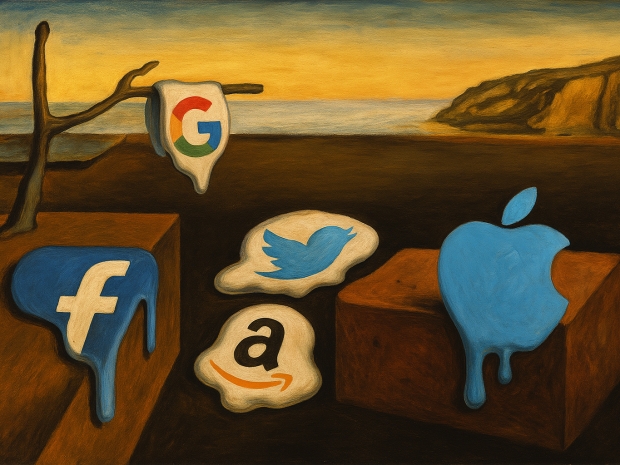For those who came in late, a sweeping new tariff plan sent tech stocks into a nosedive last week, wiping out hundreds of billions in value and rattling the cocaine nose jobs of Wall Street’s nerves.
The new tariffs impose a 10 per cent baseline on all imports, with sharper penalties targeting China and Taiwan. That’s rattled firms heavily reliant on overseas manufacturing — and few are more exposed than the Fruity Cargo Cult Apple.
Apple’s shares plunged more than nine per cent last Wednesday alone, the company’s worst single-day performance in five years. The sell-off stripped over $311 billion from its market cap, dragging it down to $3 trillion. That followed a bleak warning from
Wedbush analyst Dan Ives, who slashed his target for Apple’s stock by 20 per cent said: “With 90 per cent of iPhones made in China, these tariffs could be a gut punch to Apple’s supply chain and margins,” Ives said. “A move to US production would be costly and take years to ramp.”
Software King of the World, Microsoft dropped about 3.5 per cent across the week. Alphabet sank 3.4 per cent, and Amazon slipped nearly 4 per cent. Meta — already struggling with ad market jitters — fell five per cent as investors feared the global economic slowdown would hurt its overseas business.
The carnage was worse in chips. Nvidia, the AI darling whose meteoric rise defined 2024, saw its shares fall 7.3 per cent amid fears that Taiwan Semiconductor Manufacturing Co. — its key supplier — would be drawn into the tariff firestorm. Nvidia has now lost more than a quarter of its value since the start of the year.
“Investors are trying to price in total chaos,” one Wall Street analyst told The Times. “Every major tech firm is exposed, and right now, there is no clear path out of this mess.”
Tesla wasn’t spared either. Ives slashed its target by 43 per cent, blaming Elon Musk’s dubious alliance with Trump for cutting costs while cutting corners.
“Musk’s cost-cutting alliance with Trump may reduce tariffs, but it’s clear the brand is taking a global beating,” Ives said. “We’re watching a slow-motion crisis unfold.”
The Nasdaq dropped into bear territory, and the Dow lost more than 2,200 points. The S&P 500 had its worst day since the 2020 pandemic crash.
CNBC’s Jim Cramer said: “This is a Black Monday setup. Tech is getting annihilated and we’re not even at the bottom yet.”
Even more severe was the tariff’s impact on retail logistics. The death of the “de minimis” rule — which had allowed $ 800 worth of Chinese imports to enter duty-free — spells trouble for Amazon, eBay, and every direct-from-China e-commerce player. Analysts say it could wreck price structures and force widespread supply chain redesigns.
Trump has addressed the recent stock market turmoil triggered by his administration's sweeping tariffs. Speaking to reporters aboard Air Force One on Sunday, Trump said: "I don't want anything to go down, but sometimes you have to take medicine to fix something."
"We have been treated so badly by other countries because we had stupid leadership that allowed this to happen."
Moody's Analytics chief economist Mark Zandi said that if the tariffs lead to retaliatory measures from other nations, the U.S. could experience a recession, with GDP potentially contracting by two per cent and unemployment rising to 7.5 per cent.
Box CEO Aaron Levie tweeted that “US tech dominance is in peril… CEOs in the sector were deeply worried about a sustained reduction in scale and output due to protectionist trade policies.”
In a follow-up comment, he warned that the entire cloud and AI industries could face a “retrenchment period” as costs balloon and margins get squeezed.
A Jefferies investment note described the tariffs as a kind of “reality check” for over-inflated expectations. Analysts there suggested that several Big Tech firms would use this crisis as “a hall pass to shrink guidance and rebalance growth targets,” essentially acknowledging that the age of meteoric, unbroken expansion might be coming to a close.




